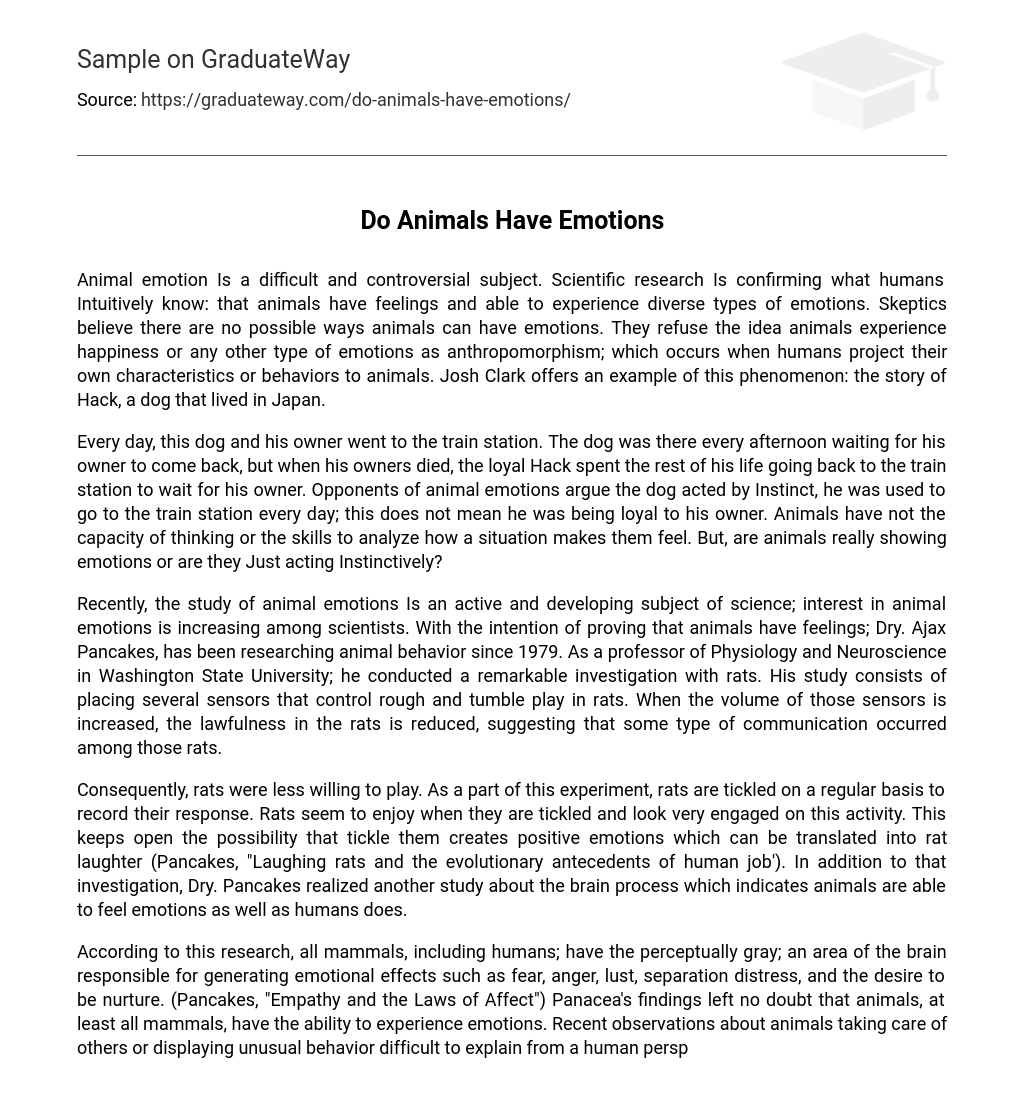Animal emotion is a complex and contentious topic. Scientific studies are confirming what humans instinctively believe: that animals have feelings and are capable of experiencing various types of emotions. However, skeptics argue that animals cannot have emotions, viewing the concept as anthropomorphism, where humans attribute their own traits and behaviors to animals. An example of this is the story of Hack, a dog that resided in Japan, as explained by Josh Clark.
Every day, this dog and his owner went to the train station. The dog faithfully waited for his owner to return each afternoon. However, after his owners passed away, the devoted Hack continued to spend the rest of his life going back to the train station in anticipation of seeing his owner again. Critics who deny animal emotions argue that the dog’s actions were driven by instinct. They suggest that he was simply accustomed to visiting the train station daily and it does not necessarily indicate loyalty towards his owner. These skeptics believe that animals lack the ability to think and analyze their emotions. Nevertheless, one question remains: Do animals truly exhibit emotions or are they purely acting based on instinct?
Dr. Ajax Pancakes, a professor of Physiology and Neuroscience at Washington State University, has been studying animal emotions since 1979. He conducted an influential study with rats to prove that animals experience feelings. In this experiment, he installed sensors that regulate rough and tumble play in the rats. When the volume of these sensors was increased, the rats’ behavior became less orderly, suggesting some kind of communication between them.
As a result, the willingness of rats to play decreased. In order to study their response, rats were regularly tickled as part of an experiment. It was observed that rats appeared to enjoy being tickled and showed a high level of engagement in this activity. This suggests that tickling rats can generate positive emotions which may be translated into rat laughter (Pancakes, “Laughing rats and the evolutionary antecedents of human job”). Additionally, Dr. Pancakes conducted another study on the brain processes that indicate animals can experience emotions similar to humans.
According to a study by Pancakes, it has been determined that all mammals, including humans, possess the perceptually gray – a part of the brain that generates emotional effects such as fear, anger, lust, separation distress, and the desire for nurture (“Empathy and the Laws of Affect”). The findings from Panacea’s research have removed any doubts about animals’ ability to experience emotions. Furthermore, recent observations of animals taking care of others or exhibiting inexplicable behavior from a human viewpoint lead us to speculate that there is something more than just instinct at play in their brains and hearts.
This example is from an amazing video on Animal Planet that showcases a dog’s attempt to cross the highway. Unfortunately, one of the dogs gets hit by a car and suffers severe injuries. However, the other brave dog risks its own life to rescue the injured dog and successfully pulls it to safety on the opposite side of the highway. Such an extraordinary case is challenging for skeptics to debunk. (Animal Planet)
Scientists have not only studied animal behavior in captivity but also conducted research on animals in their natural habitats. For several years, wildlife biologist Shiva Ball and a team of researchers have been observing elephant behavior in Samba’s, Kenya.
Elephants have an incredible skill of identifying and differentiating every single elephant in their own families. They establish strong connections with their family members, and one remarkable behavior they display is the ability to feel grief. When a member of their family dies, the entire group mourns together. In her field diary entries, Ball describes an event concerning Eleanor, a matriarch elephant from one of the many elephant families. Eleanor’s movement was impeded because she was bitten by a snake, preventing her from keeping up with the rest of the herd.
Shortly after Eleanor fell, another matriarch elephant from a separate family made multiple attempts to lift her. This distressed, anxious elephant was deeply concerned for Eleanor’s well-being. Despite her efforts, she was unable to rescue Eleanor, and eventually had to leave. Tragically, Eleanor succumbed to the venomous bite she had suffered. The next day, not only did Loner’s family but also elephants from various other families gathered at the location where she passed. Astonishingly, her own family continued to frequently visit her lifeless body (Ball).
Journalist Roger Hightailed highlights the findings of a team of researchers from Oxford University who have been studying the movement patterns of elephants in Kenya using a radio tracking system. The researchers have concluded that elephants show a distinct fascination with the deceased members of their species, suggesting that they are capable of grieving and experiencing emotions such as compassion. Recent discoveries have revealed that mammals possess similar nervous system structures and neurological compositions that play a crucial role in emotions.
According to Professor Marc Befog from the University of Colorado, neuroscience demonstrates that humans are not the only ones who experience emotions. Dogs and other animals can also feel happiness, sadness, and anger. They communicate their emotions through various forms of behavior such as their tails, postures, gestures, gaits, mouths, eyes, ears, and noses (Befog). Despite scientific evidence supporting and validating the existence of emotions in animals, there are still skeptics who deny their emotional capacity.





